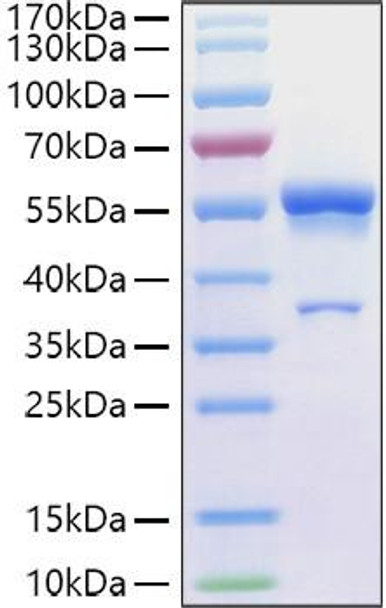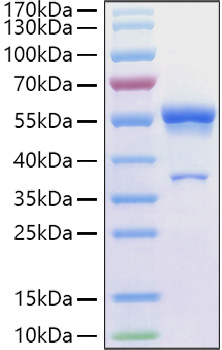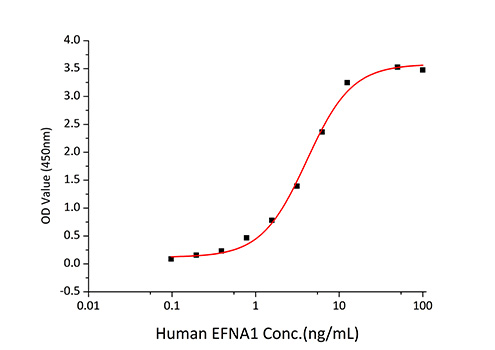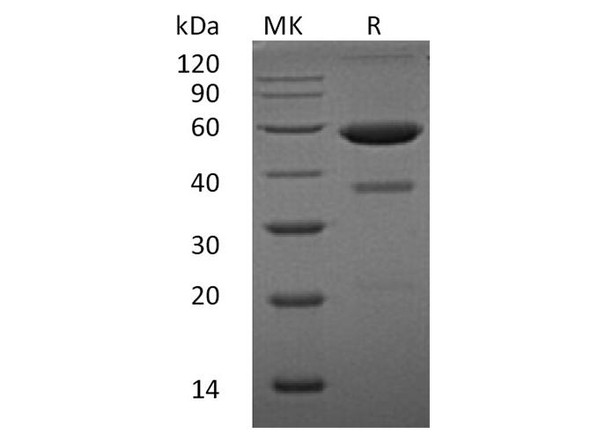Description
Recombinant Human Ephrin-A1/EFNA1 Protein
The Recombinant Human Ephrin-A1/EFNA1 Protein is a biologically active recombinant protein that plays a significant role in various cellular processes and signaling pathways in human biology. This protein is widely employed in immunological research, cell biology studies, protein-protein interaction analyses, and therapeutic development, providing researchers with a reliable tool for investigating Ephrin-A1/EFNA1 function and its implications in health and disease.
This product (SKU: RPCB1258) is produced using HEK293 cells and features a C-hFc tag for convenient detection and purification. The protein exhibits a calculated molecular weight of 45.32 kDa with an observed molecular weight of 55-60 kDa under denaturing conditions, achieving ≥ 90 % as determined by SDS-PAGE.. Functional bioactivity has been validated through rigorous quality control assays, confirming its suitability for demanding research applications.
Key Features
| High Purity by Affinity Chromatography | |
| Mammalian & Bacterial Expression Systems | |
| High lot-to-lot consistency via strict QC |
| Product Name: | Recombinant Human Ephrin-A1/EFNA1 Protein |
| SKU: | RPCB1258 |
| Size: | 10 μg , 20 μg , 50 μg , 100 μg |
| Reactivity: | Human |
| Synonyms: | B61, ECKLG, EFL1, EPLG1, LERK-1, LERK1, TNFAIP4, EFNA1, ECKLG, EFL1, EPLG1, LERK-1, LERK1, TNFAIP4, ephrin-A1 |
| Tag: | C-hFc |
| Expression Host: | HEK293 cells |
| Calculated MW: | 45.32 kDa |
| Observed MW: | 55-60 kDa |
| Gene ID: | 1942 |
| Protein Description: | High quality, high purity and low endotoxin recombinant Recombinant Human Ephrin-A1/EFNA1 Protein (RPCB1258), tested reactivity in HEK293 cells and has been validated in SDS-PAGE.100% guaranteed. |
| Endotoxin: | < 1 EU/μg of the protein by LAL method. |
| Purity: | ≥ 90 % as determined by SDS-PAGE. |
| Formulation: | Lyophilized from a 0.22 μm filtered solution of PBS, pH 7.4. |
| Bio-Activity: | Measured by its binding ability in a functional ELISA. Immobilized Human EphA2 at 1 μg/mL (100 μL/well) can bind Human EFNA1 with a linear range of 0.098-4.084 ng/mL. |
| Reconstitution: | Centrifuge the vial before opening. Reconstitute to a concentration of 0.1-0.5 mg/mL in sterile distilled water. Avoid vortex or vigorously pipetting the protein. For long term storage, it is recommended to add a carrier protein or stablizer (e.g. 0.1% BSA, 5% HSA, 10% FBS or 5% Trehalose), and aliquot the reconstituted protein solution to minimize free-thaw cycles. |
| Storage: | Store at -20℃.Store the lyophilized protein at -20℃ to -80 ℃ up to 1 year from the date of receipt. After reconstitution, the protein solution is stable at -20℃ for 3 months, at 2-8℃ for up to 1 week. |
EPH-related receptor tyrosine kinase ligand 1 (abbreviated as Ephrin-A1) also known as ligand of eph-related kinase 1 or EFNA1, is a member of the ephrin (EPH) family. The Eph family receptor interacting proteins (ephrins) are a family of proteins that serve as the ligands of the Eph receptor, which compose the largest known subfamily of receptor protein-tyrosine kinases (RTKs). Ephrin-A1/EFNA1 and its Eph family of receptor tyrosine kinases are expressed by cells of the SVZ. Ephrin subclasses are further distinguished by their mode of attachment to the plasma membrane: ephrin-A ligands bind EphA receptors and are anchored to the plasma membrane via a glycosylphosphatidylinositol (GPI) linkage, whereas ephrin-B ligands bind EphB receptors and are anchored via a transmembrane domain. An exception is the EphA4 receptor, which binds both subclasses of ephrins. Ephrin-A1 and one of its receptor EphA2 were expressed in xenograft endothelial cells and also tumor cells and play a role in human cancers, at least in part by influencing tumor neovascularization.








